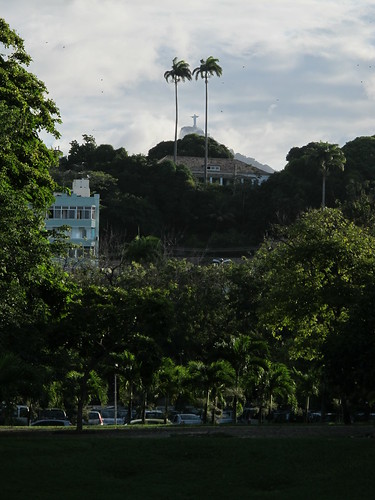I'm in Rio De Janerio today on my first full day of a nine-day trip to explore the impacts on biofuels policy here in Brazil and back home in the U.S. on land-use change here (ILUC). As I wrote about earlier this week, the trip was organized by IATP and includes a mix of farmers, ethanol producers, environmentalists and one academic who also fits into a number of those other categories.
We all got to Rio with no problems and spent the afternoon wandering along the beach and downtown. This is a beautiful and incredibly lively city, and our conversations kept switching between biofuels and policy, land-use and agriculture, and hey look at that!
We sat down early on in the afternoon and shared our reasons for coming on this trip. The perspectives on the link between biofuels policy and land-use change are all across the board. Some largely rejected the idea of ILUC but wanted to understand why others believed in it. Some are trying to understand the details better so they can better explain and refine the accounting for the emissions from ILUC. All of us expressed interest in both understanding what's happening on the ground in Brazil from Brazilians and at the same time getting a broader perspective on the important and extremely complicated set of links between policy, biofuels production, land use, food and feed production, food prices, food security, economic development, energy security... the list goes on.
On the one hand, ILUC is very simple and direct: biofuels today require land that could be used to produce food or feed.  This land is limited. If we produce even a little less food or feed, the markets adjust. We call it indirect, but it's really very direct and fundamental to any product that requires large amounts of land. We should think about oil the same way, but I've yet to identify a aspect of oil production that is as fundamental to gasoline as land is to current biofuels. But of course, there is little that is simple in the world of energy policy, land-use policy or agriculture policy.
This land is limited. If we produce even a little less food or feed, the markets adjust. We call it indirect, but it's really very direct and fundamental to any product that requires large amounts of land. We should think about oil the same way, but I've yet to identify a aspect of oil production that is as fundamental to gasoline as land is to current biofuels. But of course, there is little that is simple in the world of energy policy, land-use policy or agriculture policy.
As John Sheehan from the University of Minnesota said during this initial discussion, biofuels keep taking us to ever deeper and wider into the questions around sustainability.
One thing I already learned is that the threat to the Pantanal is not from filling but from conversion of the neighboring Cerrado. The Cerrado drains into the Pantanal and is being converted for soy and sugar cane and the concern is that the fertilizer, herbicides, pesticide runoff and changes in hydrology maybe damaging the Pantanal.
Oh and we saw this too!

